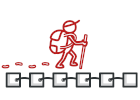
Ітератор на C#
Ітератор — це поведінковий патерн, що дозволяє послідовно обходити складну колекцію, не розкриваючи деталі її реалізації.
Завдяки Ітераторові, клієнт може обходити різні колекції в один і той же спосіб, використовуючи єдиний інтерфейс ітераторів.
Складність:
Популярність:
Застосування: Патерн можна часто зустріти в C#-коді, особливо в програмах, що працюють з різними типами колекцій, коли потрібно виконати обхід різних сутностей.
Ознаки застосування патерна: Ітератор легко визначити за методами навігації (наприклад, отримання наступного/попереднього елементу і т. д.). Код, який використовує ітератор, часто взагалі не має посилань на колекцію, з якою працює ітератор. Ітератор або приймає колекцію в параметрах конструктора під час створення, або повертається до самої колекцією.
Концептуальний приклад
Цей приклад показує структуру патерна Ітератор, а саме — з яких класів він складається, які ролі ці класи виконують і як вони взаємодіють один з одним.
Program.cs: Приклад структури патерна
using System;
using System.Collections;
using System.Collections.Generic;
namespace RefactoringGuru.DesignPatterns.Iterator.Conceptual
{
abstract class Iterator : IEnumerator
{
object IEnumerator.Current => Current();
// Returns the key of the current element
public abstract int Key();
// Returns the current element
public abstract object Current();
// Move forward to next element
public abstract bool MoveNext();
// Rewinds the Iterator to the first element
public abstract void Reset();
}
abstract class IteratorAggregate : IEnumerable
{
// Returns an Iterator or another IteratorAggregate for the implementing
// object.
public abstract IEnumerator GetEnumerator();
}
// Concrete Iterators implement various traversal algorithms. These classes
// store the current traversal position at all times.
class AlphabeticalOrderIterator : Iterator
{
private WordsCollection _collection;
// Stores the current traversal position. An iterator may have a lot of
// other fields for storing iteration state, especially when it is
// supposed to work with a particular kind of collection.
private int _position = -1;
private bool _reverse = false;
public AlphabeticalOrderIterator(WordsCollection collection, bool reverse = false)
{
this._collection = collection;
this._reverse = reverse;
if (reverse)
{
this._position = collection.getItems().Count;
}
}
public override object Current()
{
return this._collection.getItems()[_position];
}
public override int Key()
{
return this._position;
}
public override bool MoveNext()
{
int updatedPosition = this._position + (this._reverse ? -1 : 1);
if (updatedPosition >= 0 && updatedPosition < this._collection.getItems().Count)
{
this._position = updatedPosition;
return true;
}
else
{
return false;
}
}
public override void Reset()
{
this._position = this._reverse ? this._collection.getItems().Count - 1 : 0;
}
}
// Concrete Collections provide one or several methods for retrieving fresh
// iterator instances, compatible with the collection class.
class WordsCollection : IteratorAggregate
{
List<string> _collection = new List<string>();
bool _direction = false;
public void ReverseDirection()
{
_direction = !_direction;
}
public List<string> getItems()
{
return _collection;
}
public void AddItem(string item)
{
this._collection.Add(item);
}
public override IEnumerator GetEnumerator()
{
return new AlphabeticalOrderIterator(this, _direction);
}
}
class Program
{
static void Main(string[] args)
{
// The client code may or may not know about the Concrete Iterator
// or Collection classes, depending on the level of indirection you
// want to keep in your program.
var collection = new WordsCollection();
collection.AddItem("First");
collection.AddItem("Second");
collection.AddItem("Third");
Console.WriteLine("Straight traversal:");
foreach (var element in collection)
{
Console.WriteLine(element);
}
Console.WriteLine("\nReverse traversal:");
collection.ReverseDirection();
foreach (var element in collection)
{
Console.WriteLine(element);
}
}
}
}
Output.txt: Результат виконання
Straight traversal:
First
Second
Third
Reverse traversal:
Third
Second
First